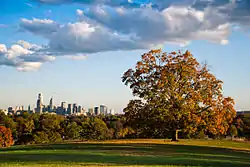Nicknames of Philadelphia
Philadelphia has long been nicknamed "The City of Brotherly Love" from the literal meaning of the city's name in Greek (Greek: Φιλαδέλφεια ([pʰilaˈdelpʰeːa], Modern Greek: [filaˈðelfia]), "brotherly love"), derived from the Ancient Greek terms φίλος phílos (beloved, dear, or loving) and ἀδελφός adelphós (brother, brotherly).[1] The city was first named by its founder, William Penn.[2]

Philadelphia skyline as seen from Belmont Plateau, Fairmount Park.
"Philadelphia" is also frequently shortened to simply Philly /fɪli/. The Philadelphia Phillies, the city's baseball team, officially formed in 1883.[3]
Other nicknames
- "The Athens of America" - So called as early as 1733 by the directors of the Library Company of Philadelphia.[4] Gilbert Stuart referred to the city using this phrase, referring to Philadelphia's reputation for science, industry, art, and intellectual life.[5]
- "The Birthplace of America" - derived from Philadelphia's role in the American Revolution and location of the signing of the Declaration of Independence[6]
- "The Cradle of Liberty" - derives from Philadelphia's role in the American Revolution. Also a nickname of Boston.[7]
- "The Quaker City" - was given in reference to the religion of the city's early settlers.[8]
- "The Workshop of the World" - Philadelphia's Industrial Revolution history gave it this nickname; in the pre-World War II 20th century, Philadelphia "led the nation in production of such diverse products as locomotives, streetcars, saws, steel ships, textiles, rugs, hosiery, hats, leather, and cigars. It held second place in the production of sugar, fertilizer, foundry castings, petroleum, products, chemicals, and drugs."[9]
- "The City that Loves you Back" - this slogan was introduced by the Greater Philadelphia Tourism Marketing Corporation (GPTMC) in a 1997 advertising campaign. The motto was both "a reply and a challenge to the 'I Love New York' slogan" and countered the "antisocial reputation" that Philadelphia had developed.[10]
- "The City of Neighborhoods" - unclear how this name emerged; Philadelphia was called "The City of Homes" by the 1870s, and was called "a city of residences" in a book published in 1893, referencing the city's high levels of home ownership. The nicknamed refers to the city's many distinct neighborhoods and sense of neighborhood pride.[11]
- "The City That Bombed Itself" - In 1985, Philadelphia police bombed a rowhouse occupied by MOVE, a radical black-power group. The bombing killed 11 people, destroyed 61 homes, left 250 people homeless, and earned the city this title.[12][13]
- "Filthadelphia" or "Filthydelphia" - a past reference to local environmental and sanitation issues[14][15]
- "The Sixth Borough" - a reference due to Philadelphia's close proximity to New York City and the movement of New York residents to Philadelphia for various reasons, including lower rent prices and generally lower cost of living.[16][17][18][19][20]
References
- The popular educator. Oxford, England: Oxford University. 1767. p. 776. Retrieved July 14, 2011.
- Chris Satullo, "City of Brotherly Love" in Encyclopedia of Greater Philadelphia (Mid-Atlantic Regional Center for the Humanities, Rutgers-Camden).
- Seamus Kearney & Dick Rosen (2011). The Philadelphia Phillies. Arcadia Publishing. p. 7.
- "LCP Art & Artifacts". Library Company of Philadelphia. 2007.
- Russell Frank Weigley (1982). Philadelphia: A 300 Year History. Barra Foundation/W.W. Norton. pp. 257-57.
- "Words and Their Stories: Nicknames for Philadelphia and Boston". Voice of America. Retrieved July 11, 2017.
- "Words and Their Stories: Nicknames for Philadelphia and Boston". Voice of America. Retrieved July 11, 2017.
- . New International Encyclopedia. 1905.
- Fredric Miller (1983). Still Philadelphia. Temple University Press. p. 73.
- Richardson Dilworth, "The City that Loves you Back" in Encyclopedia of Greater Philadelphia (Mid-Atlantic Regional Center for the Humanities, Rutgers-Camden).
- Linn Washington Jr., "City of Neighborhoods" in Encyclopedia of Greater Philadelphia (Mid-Atlantic Regional Center for the Humanities, Rutgers-Camden).
- Howard J. Wiarda (2010). Think Tanks and Foreign Policy: The Foreign Policy Research Institute and Presidential Politics. Lexington Books. pp. 7–8.
- Karen Ivory (2015). Pennsylvania Disasters: True Stories of Tragedy and Survival (2d ed.). Globe Pequot. pp. 155–56.
- Gallma, James Matthew (2000). Receiving Erin's Children: Philadelphia, Liverpool, and the Irish Famine. University of North Carolina Press. p. 258.
- Silverstein, Michael (1990). The environmental factor: its impact on the future of the world economy and your investments. Longman Financial Services Publishing.
- Gabriel, Trip (December 15, 2013). "A Grand Weekend Out for Pennsylvanians". The New York Times. Retrieved July 15, 2016.
- Taylor, Kate (July 31, 2013). "It's Time to Vote for a Sticker on Voting". The New York Times. Retrieved July 15, 2016.
- Goodman, J. David (December 1, 2009). "Troubles in Philly, Lessons for New York?". The New York Times. Retrieved July 15, 2016.
- Sifton, Sam (October 29, 2009). "On the Question of Cheese Steaks". The New York Times. Retrieved July 15, 2016.
- Flegenheimer, Matt (November 24, 2014). "D.N.C. Picks New York City as a Finalist for Its 2016 Convention". The New York Times. Retrieved July 15, 2016.
This article is issued from Wikipedia. The text is licensed under Creative Commons - Attribution - Sharealike. Additional terms may apply for the media files.